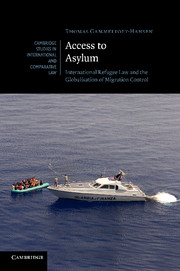Book contents
- Frontmatter
- Contents
- Foreword
- Preface
- Acknowledgements
- Table of treaties and other international instruments
- Table of cases
- 1 Introduction
- 2 The refugee and the globalisation of migration control
- 3 Refugee protection and the reach of the non-refoulement principle
- 4 Offshore migration control and the concept of extraterritorial jurisdiction
- 5 The privatisation of migration control and state responsibility
- 6 ‘Hic abundant leones’: the institutional reach of refugee protection
- 7 Conclusion
- Bibliography
- Index
- CAMBRIDGE STUDIES IN INTERNATIONAL AND COMPARATIVE LAW
- References
2 - The refugee and the globalisation of migration control
Published online by Cambridge University Press: 03 May 2011
- Frontmatter
- Contents
- Foreword
- Preface
- Acknowledgements
- Table of treaties and other international instruments
- Table of cases
- 1 Introduction
- 2 The refugee and the globalisation of migration control
- 3 Refugee protection and the reach of the non-refoulement principle
- 4 Offshore migration control and the concept of extraterritorial jurisdiction
- 5 The privatisation of migration control and state responsibility
- 6 ‘Hic abundant leones’: the institutional reach of refugee protection
- 7 Conclusion
- Bibliography
- Index
- CAMBRIDGE STUDIES IN INTERNATIONAL AND COMPARATIVE LAW
- References
Summary
The refugee in international law occupies a legal space characterized, on the one hand, by the principle of State sovereignty and the related principles of territorial supremacy and self-preservation; and, on the other hand, by competing humanitarian principles deriving from general international law…and from treaty.
The refugee is both a product of, and remains closely embedded in, a complex interplay between state prerogatives and human rights, and politics and law. This chapter sets out to examine more generally this relationship in order to understand the drive towards extraterritorial and privatised migration control that we are currently witnessing.
As noted above, the nexus between the refugee and migration control has arguably always been a point of confrontation between sovereign rights and international law as exemplified by the 1951 Refugee Convention. Offshore and privatised migration control may in this sense be seen as political strategies by the state to bypass this confrontation and reclaim discretionary power. Yet in the process a new field of contestation opens up between universal and particularist claims to the applicability of international refugee and human rights law. It is argued that the difficulties in bringing international law to bear on offshore and privatisation policies reflect an underlying conflict between the universal purpose of human rights law on the one hand, and its formalisation as a matter of treaty law on the other.
This is particularly evident in the international refugee protection regime, which remains firmly vested in territorial principles for dividing and tailoring protection obligations.
- Type
- Chapter
- Information
- Access to AsylumInternational Refugee Law and the Globalisation of Migration Control, pp. 11 - 43Publisher: Cambridge University PressPrint publication year: 2011

